|
Henry H. Parker - Nature's Mirror
Click on a painting below to start the exhibition
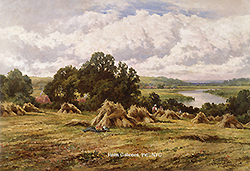 Henry H. ParkerHarvest Time on the Thames, Henley Henry H. ParkerHarvest Time on the Thames, Henley |
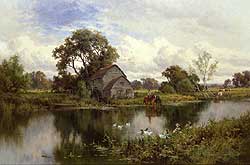 Henry H. ParkerBy the Mill Henry H. ParkerBy the Mill |
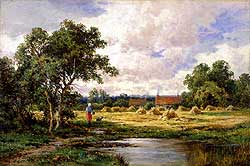 Henry H. ParkerAt Betchworth, Surrey Henry H. ParkerAt Betchworth, Surrey |
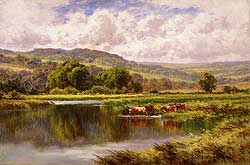 Henry H. ParkerThe River Mole, Dorking Surrey Henry H. ParkerThe River Mole, Dorking Surrey |
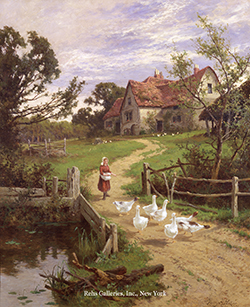 Henry H. ParkerA Berkshire Homestead Henry H. ParkerA Berkshire Homestead |
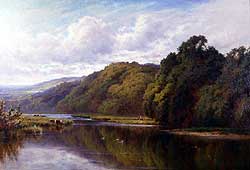 Henry H. ParkerSleeping Waters, The River Wey Henry H. ParkerSleeping Waters, The River Wey |
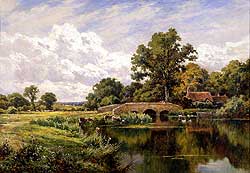 Henry H. ParkerThe River Loddon, Near Basing, Hants Henry H. ParkerThe River Loddon, Near Basing, Hants |
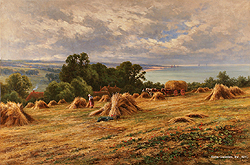 Henry H. ParkerA Sussex Cornfield, Littlehampton Henry H. ParkerA Sussex Cornfield, Littlehampton |
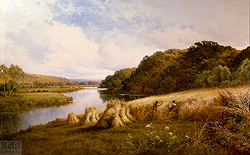 Henry H. ParkerHarvesting Henry H. ParkerHarvesting |
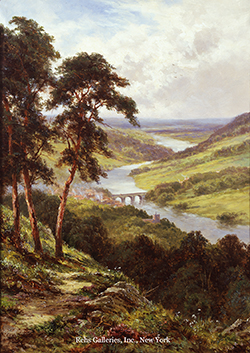 Henry H. ParkerDunkeld & Birnam from Craigibarns Henry H. ParkerDunkeld & Birnam from Craigibarns |
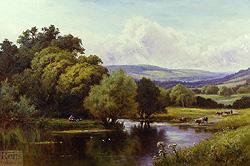 Henry H. ParkerThe Mole, Dorking, Surrey Henry H. ParkerThe Mole, Dorking, Surrey |
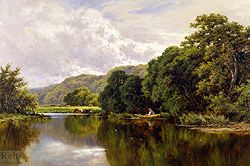 Henry H. ParkerNature's Mirror, on the Banks of the Thames Henry H. ParkerNature's Mirror, on the Banks of the Thames |
|
Henry H. Parker was a British artist working at the end of the Victorian Era. It is believed that he was born in London and was based there for most of his life. Like many of his contemporaries, he concentrated on painting "pure" landscapes - a genre that he mastered early in his career. His landscapes are lush and tranquil, frequently featuring a lone figure in a boat or walking down a country path. The scenes are often sunny and bright and the waters are calm and soothing.
His style shows a great influence by the Impressionists, through his use of bright colors and quick brush strokes, but a definite understanding of the Academic principals is also displayed. This style of painting was very typical for the late Victorian landscape artists who strove to incorporate the new Impressionist techniques in their more traditional paintings. His landscapes and skies were created with a free, but controlled, application of paint while the watery areas of his work were handled in the more traditional way - using glazes to create depth and reflections. His paintings are well composed, beautifully balanced and capture the landscape in its most pure and natural state. This colorful and free look was a welcome relief to the traditional Victorian landscapes of the previous decades and this, coupled with Parker's choice of subject matter, brought him great success. His favorite locales were in Surrey, Kent and Wales - especially views on the Thames - and he would often sign and title his works, with their exact location, on the reverse.
While there are not definite records to prove this, his work shows great similarity in both technical and subject matter to that of Benjamin Williams Leader (1831-1923); if he was not a student of Leader's, he definitely studied his works.
Of final note, it is very interesting that Parker was one of only a handful of artists, of his caliber, to never exhibit at the major exhibition halls in England during his lifetime.
The works illustrated in this exhibition are excellent examples of the artist's most desirable subject matter - beautiful, rustic landscapes executed with impressionistic brush strokes and color.
This essay is copyrighted by Rehs Galleries, Inc. and may not be reproduced or transmitted without written permission from Rehs Galleries, Inc.
|